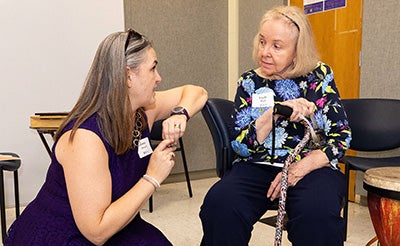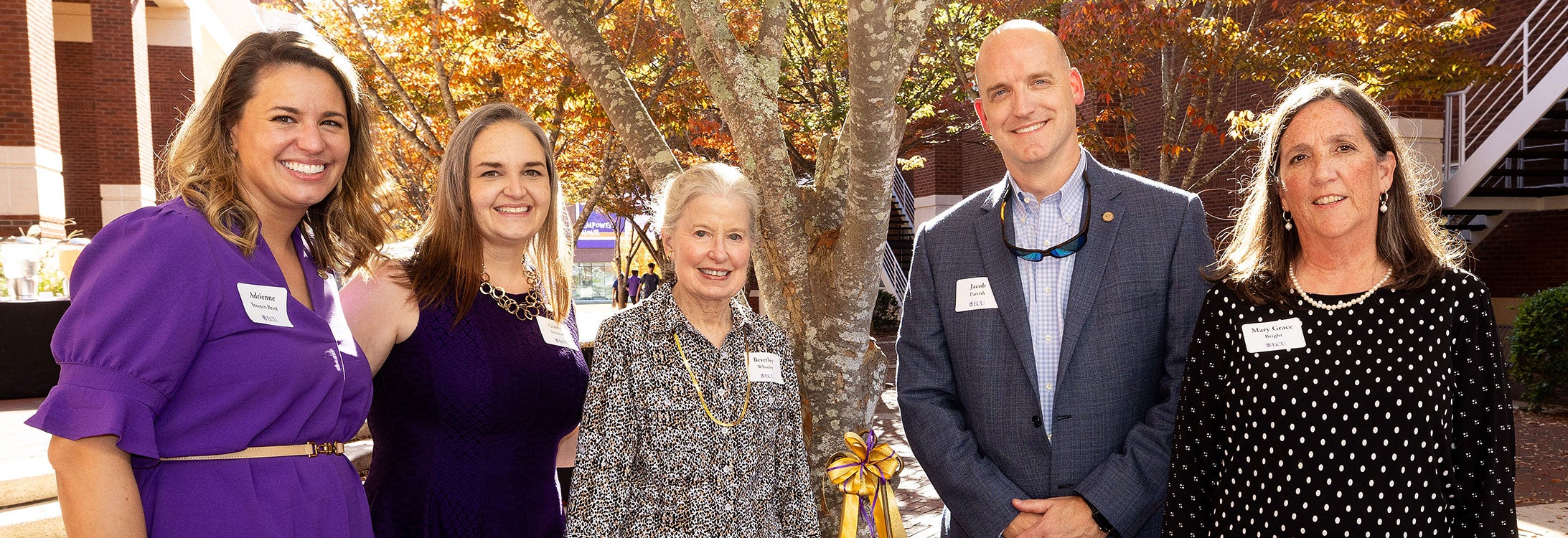MUSIC THERAPY
ECU School of Music dedicates clinic space
Crowdfunding instrumental to program’s success

Dr. Ginny Driscoll talks with former music therapy faculty member Linda High in the new music therapy clinic in Joyner East.
A crowdfunding campaign to raise $20,000 kicks off Nov. 1 to help fulfill the vision for the new music therapy clinic in East Carolina University’s School of Music. Funding raised through the campaign will cover operational expenses of the clinic and support the purchase of instruments used in the program.
The campaign will also allow the music therapy program to receive a challenge grant from the Eddie and Jo Allison Smith Family Foundation.
Drs. Ginny Driscoll and Adrienne Steiner-Brett, assistant professors of music therapy, are leading the campaign to make the clinic’s services a reality. Meeting the goal will provide learning opportunities for music therapy students and help the clinic provide services to individuals and families across the region who may be unable to afford services.
Steiner-Brett said the clinic will allow students to pursue a variety of clinical training opportunities and interdisciplinary research collaborations.
“We utilize primarily live music in order to modify musical elements in real time to encourage specific neurologic activity to help clients achieve their goals,” she said. “Music therapists are proficient in piano, voice and guitar and learn music across almost all genres and decades.”
Driscoll said gifts can provide small instruments like shakers or movement props to large drums, guitars or barred xylophones used in their clinical work.
“Through the use of therapeutic music experiences, we provide neurologic stimuli that help clients reach a multitude of health and wellness goals,” Driscoll said. “Music therapy allows individuals to be successful in a variety of ways, from regaining speech after a stroke to connecting with a family member who has Alzheimer’s. Music therapists empower our clients and their families by providing opportunities for creating music and sharing their stories while living their fullest lives possible.”
To support the music therapy clinic, visit the university advancement crowdfunding site.
Musical notes from the Sonic Gates were the perfect accompaniment to the ceremony announcing a new music therapy clinic in the East Carolina University School of Music.
The space in 219 Joyner East was dedicated Friday to the Pitt County Group Homes Foundation (PCGHF) in an event on the Sonic Plaza. The naming honors the foundation’s longstanding relationship with ECU, including gifts and commitments totaling $60,000 to support the music therapy program.
The music therapy clinic is dedicated to all those seeking healing and comfort through the power of music, said Dr. Linda Kean, dean of the College of Fine Arts and Communication. Kean thanked the donors for the opportunity to share the music therapy clinic with the community as a “beacon of hope and healing and a place where the transformative power of music can be experienced.”
“May this space be a sanctuary where individuals can find solace, express themselves and find new ways to navigate emotions and experiences,” Kean said. “To the music therapy faculty and students who use this room, may you find inspiration and the tools you need to guide others on this journey.”
Christopher Dyba, vice chancellor for university advancement, recognized the longstanding partnership between ECU and the Pitt County Group Homes and described its philanthropic support as one part of their 40-year relationship.
“ECU’s music therapy program has been working with Pitt County Group Home residents since the 1980s, providing student-led music therapy experiences,” Dyba said. “We are honored to have many of these men and women with us today as we celebrate the dedication of Joyner East 219.”
Dyba said the foundation created a priority fund to support the new on-campus clinic and is establishing a scholarship endowment in music therapy. The fund will allow the College of Fine Arts and Communication and the School of Music to meet one of its top priorities of supporting clinic operations.
Music therapy pioneers
The School of Music and ECU faculty have been pioneers of music therapy. Chris Ulffers, director of the School of Music, said his knowledge of the program was formed by former faculty, Drs. Barbara Memory and Michelle Hairston, who attended the clinic announcement.
“When I came to ECU in 1992, I had never heard of music therapy. I quickly learned about the program, the students, the curriculum and its relationships within our community,” Ulffers said. “Most of all, what I learned about music therapy and about music therapists is that music therapists are fierce. They are forces to be reckoned with.”
Ulffers also recognized the impact of music therapy pioneer the late Dr. Ruth Boxberger. She was the first woman to earn a doctorate in music therapy in 1963 and is considered one of the founders of the profession. Boxberger taught at ECU from 1967 to 1987.
“Fast forward to today and we have two new fierce leaders in Drs. (Ginny) Driscoll and (Adrienne) Steiner-Brett and they are moving our program to the next level,” Ulffers said. “It’s important to know that it’s not just the next level for ECU and our students, but for Greenville and all of eastern North Carolina.”
Ulffers said the clinic will bring music therapy services to the community by creating access to innovative new health care and wellness options in eastern North Carolina and by providing access to evidence-based and advanced clinic training and research opportunities for ECU faculty and students.
“I am thrilled this important piece of their vision is moving forward and I’m excited about the things to come,” Ulffers said.
A perfect match
The ECU music therapy department and Pitt County Group Homes have been friends since 1984 when the first group home opened in Grifton.
Mary Grace Bright, PCGHF’s executive director, remembered former ECU faculty member Dr. Rosemary Fisher’s weekly visits to share her love of music with residents, Bright said.
“They watched for her to arrive and helped her bring her ‘magic bag’ full of instruments and music into the home,” Bright said. “For an hour they were mesmerized by Rosemary and the activities she offered. Dr. Barbara Memory took over and they were equally excited to work with her.”
As new group homes were added and the music therapy program grew, residents began coming to the ECU campus for music therapy. The Heart and Soul Choir was formed and many residents joined and continue to participate today.
When Bright retired in 2021, music therapy students and faculty helped the choir write a song to honor her. “They recorded it and sent it to me. It is the most special gift I have ever received, personally or professionally, and I will cherish it forever,” Bright said.
Faculty with the music therapy department found ways to provide services during the pandemic when group homes were on lockdown for months.
“They wanted to provide music therapy via Zoom. We bought instruments and the music therapy department provided some instruments and we were back in business,” Bright said. “Though it wasn’t the same, it provided a much-needed connection with the outside world and made the individuals living in the group homes feel special and loved.
“So you can see why the donation to the music therapy clinic is the perfect match for the Pitt County Group Homes Foundation,” Bright said. “Your work makes the world a better place. We are proud to partner with you and know you will provide many more years of special moments and special memories for special people.”
Music therapy students, program clients, PCGHF board members and former music therapy faculty cheered as the plaque honoring the group homes was unveiled.
Driscoll and Steiner-Brett provided tours of the new space, where guests could see musical instruments arranged in stations based on age group and ability and supply closets ready to house new music therapy equipment.
Seeing the clinic become a reality was exciting for Cheryl Stephenson ’85, who studied music therapy at ECU. As director of the Music Academy of Eastern Carolina she frequently collaborates with the music therapy program. “It is a dream come true,” Stephenson said.
ECU’s Pursue Gold campaign to raise half a billion dollars will end in December. This ambitious effort will create new paths to success for Pirates on campus, across the country and around the world. Donor gifts during the campaign will keep ECU constantly leading and ready to advance what’s possible. Learn more at pursuegold.ecu.edu.
Related: Read about other cutting-edge work being done at ECU.
